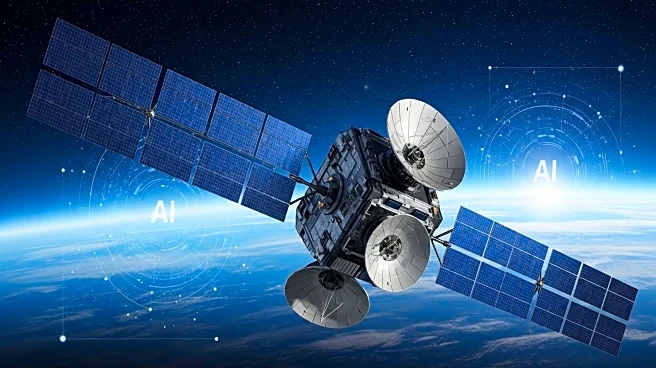What is the story about?
What's Happening?
At the World Space Business Week conference in Paris, Novaspace CEO Pacôme Révillon discussed the significant growth in the global space economy driven by expanding defense budgets and the direct-to-device race. The space sector is experiencing consolidation, with over 50 mergers and acquisitions annually since 2021. EchoStar's spectrum sale to SpaceX is an example of market reshaping. The 2024 space economy is valued at $596 billion and is projected to grow to $944 billion by 2033, largely due to downstream solutions for satellite data. The adoption of artificial intelligence is expected to transform the industry, with 50,000 spacecraft anticipated in orbit by 2030.
Why It's Important?
The expansion of defense budgets and the integration of artificial intelligence into the space sector have significant implications for global economic and technological landscapes. The U.S., along with other leading nations, is investing heavily in space systems, with defense spending accounting for a substantial portion of the budget. This growth presents opportunities for innovation and value creation in satellite data services, impacting industries such as telecommunications, navigation, and Earth observation. The consolidation within the sector may lead to increased efficiency and competitiveness, benefiting stakeholders involved in space technology development and deployment.
What's Next?
The space economy is poised for further growth, with new launch vehicle providers expected to emerge in the next five years. Novaspace anticipates the direct-to-defense market to expand significantly, projecting over 300 million monthly subscribers by 2030. This growth represents a multibillion-dollar revenue opportunity, suggesting that companies involved in satellite technology and services will continue to innovate and expand their offerings. Stakeholders, including governments and private enterprises, are likely to increase investments in space capabilities to capitalize on these emerging opportunities.
Beyond the Headlines
The integration of artificial intelligence into space systems could lead to ethical and regulatory challenges, particularly concerning data privacy and security. As more countries invest in sovereign space capabilities, geopolitical dynamics may shift, influencing international relations and collaboration in space exploration and technology development. The environmental impact of increased satellite launches and space debris management will also require attention from policymakers and industry leaders.















